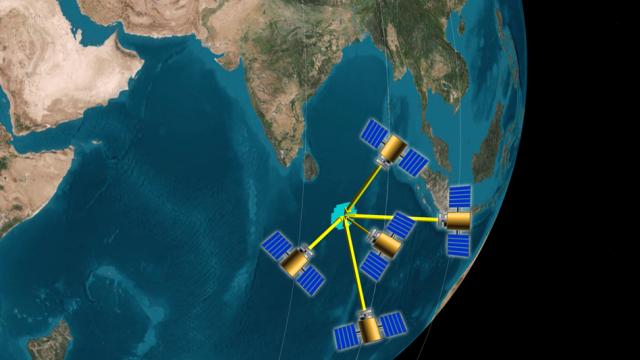Different points of view are valuable when discussing any event or describing an object. Sure, you might have your own analysis, but somebody else is going to have seen something different. By combining all angles, a clearer picture emerges.
Image: Courtesy of MIT researchers
The same concept can be seen in a recent MIT study that found a cluster of three to eight small, “shoebox-sized satellites” are more accurate than a traditional, large satellite. Since the smaller satellites have multiple angles, their measurements were around twice as accurate.
In a paper set to be published in Acta Astronautica’s September-October issue, researchers simulated how accurately a single orbiting satellite with nine sensors can measure albedo, or the amount of light reflected from Earth, versus a cluster. Those measurements were compared with the statistics gathered by NASA Goddard’s Cloud Absorption Radiometer, which can obtain data from thousands of different angles on a single spot. The more satellites were in the cluster, the more accurate the measurements.
It makes sense that the cluster would be more accurate. The Earth is a three-dimensional object and has multiple angles of its own. In order to measure anything, you’d need more than just a front-facing image.
“The Earth does not reflect equally in all directions,” said research leader Sreeja Nag. “If you don’t get these multiple angles, you might under- or overestimate how much it’s reflecting, if you have to extrapolate from just one direction.”
This is also useful if a researcher has to deal with a faulty satellite. If one of the pieces in a cluster fails, there will be others to provide backup. If you lose one solo satellite, you run the risk of losing all information. It’s the same in any team: If someone calls out sick, you’ll have someone to take over any workload.
More importantly, researchers emphasise that providing more accurate measurements of Earth will help in the fight against climate change. By providing better estimates, scientists can calculate long-term trends and projections. Nag added:
Total outgoing radiation is actually one of the biggest uncertainties in climate change, because it is a complex function of where on Earth you are, what season it is, what time of day it is, and it’s very difficult to ascertain how much heat leaves the Earth…If we can estimate the reflectance of different surface types, globally, frequently, and more accurately, which a cluster of satellites would let you do, then at least you’ve solved one part of the climate puzzle.
To replace every satellite with a cluster would be too expensive, but Nag suggests at least using them in cases where satellites need to hold a strict formation. Researchers added that they hope they can see something like this in play soon.
“Our team fully expects that a demonstration mission of this type could be flown within the next decade,” said Oli de Weck, a professor with MIT’s Department of Aeronautics and Astronautics.
[MIT]
